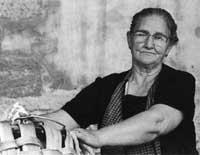XXI. 20th century "epidemic"
This has been said to Alzheimer's disease, although in the strict sense it cannot be considered as an epidemic or an epidemic, since of origin it is not infectious.
What is Alzheimer's disease?
Neurodegenerative disease (therefore, a degeneration of the nervous system), but from there it is a mystery, both for the sick and their relatives and the doctor.
During the autopsy of a demented woman, who died at age 51, Alois Alzheimer (1864-1915) found in 1907 special structures in the brain (neurotic plaques and neurofibrillary plots). And it is these structures that appear in the brain of people who have been named since then and continue to suffer from diseases that are still unknown.

It is not yet clear why this disease occurs. However, many risk factors have been mentioned that facilitate the onset of Alzheimer's disease:
- Family ruins.
- Having a passive intellectual life.
- Pathological and early memory loss.
- There have also been cases in people who have suffered a heavy blow to the head.
Who are the people with Alzheimer's disease? Especially older people, but not just those. Today, after 65 years, we can say that we enter the area of risk of this disease. For people over 65 years of age, the incidence is 1-2% and the percentage has a geometric progression as age progresses: 3% at 70 years, 10% at 75 years and almost 30% at 80. Therefore, in people who reach those ages, almost one in three will be affected by the disease, and society will have to be willing to respond healthcare and socially to an increasing number of people affected by this much more severe and harsh scourge than for family members.
Today, Alzheimer's disease ranks fourth as a cause of death among older people, following heart disease, cancer and stroke. According to statistics, the life expectancy of a person with Alzheimer's disease is shorter than that of any older person.
Symptoms and progression of the disease
Memory failures, lack of attention to the nearest environment and personal, spatial and temporal disorientation are the most spectacular symptoms of the disease. Although the severity of symptoms varies from patient to patient, in all patients the physical and mental situation slowly deteriorates throughout a process that can last about seven hundred years. And that process ends with death.
The progression of Alzheimer's disease is divided into four stages: In the first phase, the patient has small memory lapses. In the second stage, the disease remains mild, although memo errors are notorious. In the third stage the patient's identity is completely disintegrated. In the last stage, the disaster is mental, physical and very notorious.
Diagnosis is not easy
It is not so easy to differentiate yourself from other diseases that produce dementia. On the other hand, there is currently no laboratory test to diagnose Alzheimer's disease (although for the neurologist, from his experience, it does not seem so difficult to determine if the patient is affected by Alzheimer's).

Patient follow-up is always necessary to ensure diagnosis. A few years ago, many of those affected by Alzheimer's could be diagnosed as dementia in old age. Today, however, we know that sometimes Alzheimer's was diagnosed to patients who had not studied in depth and that in 20% had a recoverable dementia (according to data obtained in autopsies). 15 years ago, older people who lost their memory were called “lack of quarrel,” thinking their disease was vascular. In a few years the concept has changed and today we know that the origin of Alzheimer's disease is not vascular.
At 84 years of its first diagnosis, the most reliable way to diagnose Alzheimer's disease remains the same as that used by its discoverer, since in autopsies, with very simple histological techniques, amyloid neurotic plaques and neurofibrillary plots, normal in older people, are much more abundant in patients with Alzheimer's disease. But, of course, that can be done in autopsies. And while the person is alive, what?
Current status of treatment
Unfortunately, today this disease is like lottery: there is no way to prevent it, and worse still we do not have effective drugs.
Periodically they appear in the press, with great propaganda, news that medicines or treatments of this type “cure” Alzheimer’s disease. In early 1991 the last miracle was called THA (tetrahydro-acrymine). A year later it does not seem that its results are so good and spectacular.
Symptoms and progression of the disease
- In the first phase, the patient has small and relatively light memory lapses. Often you cannot find the right word to name something. For example, to say rennet will say “pasaidazu hori”. You will have less and less interest in your surroundings and your personal things.
- In the second stage, the disease remains mild. The mistakes to Memo are so notorious that the family immediately realizes. However, the person's ability to remember events from the distant past (i.e., from his childhood, for example) practically remains. In this phase the patient has great uncertainties to give answers. As for the weather, he is disoriented, he forgets a lot of family appointments and birthdays.
- When the patient enters the third stage, the disintegration of his personality is total. It is practically disoriented towards people, time and space. Having a normal conversation with him is almost impossible. In this phase you can take the habit of moving. It usually wanders, especially towards sunset.
- In the last stage, the disaster is mental, physical and very notorious. The patient is not able to walk either. Total loss of communicative capacity. Nor do they know their relatives. It also frequently loses intestinal and bladder control. And if you reach this stage you have to give the patient the food to the mouth.
Recommendations to help the patient with Alzheimer's
- Alzheimer's disease is now incurable. But some of your symptoms improve with proper treatment.
- The disease itself does not harm the patient.
- The patient should represent the reality around him: Who am I? Where are you? What day is it today?, etc.
- If they are nervous or aggressive it can be due to illness or for another reason. Consult your doctor.
- If the patient appears in a bad mood or contempt, take it with patience. They will be treated with love and happier.
- Prevent them from staying in bed or isolated. Maintain a positive and warm relationship that improves your quality of life.
- Treat them with the same respect and affection that you would like. You help yourself to live better.





